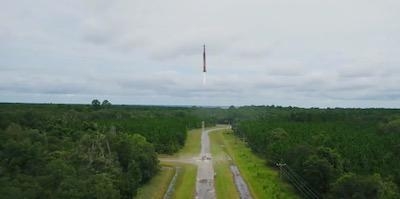First Mission With Customer Payloads Marks A Key Milestone In The Company's March Towards Orbital Launch Services
Vector, a micro satellite space launch company comprised of new-space and enterprise software industry veterans from SpaceX, Virgin Galactic, McDonnell Douglas, Boeing, Sea Launch and VMware, today announced the successful suborbital flight of its B0.002 test vehicle, a full-scale prototype of the company's Vector-R launch vehicle. This launch represents both the first customer-funded launch operation for the new space commercial launch industry, as well as the first launch out of the historic Spaceport Camden in Georgia, which was originally used by NASA in the 1960's for ground-based static fire testing of large solid rocket motors.

The flight test is particularly significant for Vector because the company is manifesting customer-sponsored experiments and payloads - a major achievement among the next generation of small launch vehicle developers. Test packages from Astro Digital, a leader in real-time satellite imagery data, and the Center for Applied Space Technology, an organization focused on space-based medicine research and applications, highlight Vector's mission to deliver increased access for organizations looking to launch microsatellites more affordably and at a higher frequency than ever before.
"Since our inception, Vector has been committed to making space open for business," said Jim Cantrell, CEO and co-founder of Vector. "Our historic launch today is a testament to the hard work of the Vector team, as well as support from NASA and Spaceport Camden. Together, we're on the fast-track to get to an orbital capability in 2018 and look forward to continuing momentum and unprecedented growth through the course of this year."
A primary objective of today's test was the demonstration and evaluation of a next-generation 3D additively manufactured engine injector developed through a collaborative research program with NASA Marshall Space Flight Center. This injector was ground tested last month and an earlier version was used in Vector's initial B0.001 launch vehicle in May. Today's launch represents another milestone for Vector, as it was the first time spark igniter technology developed with University of Alabama - Huntsville and NASA Marshall Space Flight Center was attempted to start the booster main engine.
"This is a significant accomplishment for Vector and for NASA's initiatives to advance enabling technologies for suborbital and orbital small launch vehicles," said Ron Young, NASA Flight Opportunities Program Manager. "NASA's role in helping the industry to develop commercial small satellite launch capabilities through the STMD Announcement of Collaborative Opportunities (ACO) awards, enables companies such as Vector to offer this capability to the commercial market place sooner."

Earlier this year, Georgia Governor Nathan Deal signed House Bill 1, also dubbed The Georgia Space Flight Act, to encourage commercial space activities in Georgia. Camden County has been working closely with Vector to put Spaceport Camden back on the map, not only because of its rich history of space innovation, but also to assert Camden as a top player in the competition for commercial launches. Vector conducted an initial set of ground operations at Spaceport Camden in March, 2017 to showcase the Vector-R launch system in anticipation of this groundbreaking launch.
"Vector's successful tests prove that it is an innovator in this dynamic field. Georgia looks forward to working with commercial space companies, like Vector, as we begin the next chapter of space exploration and innovation," said David Ralston, Speaker of the Georgia House of Representatives.
"By investing in Camden County to create the first commercial spaceport in Georgia - the only exclusively vertical, non-federal range on the East Coast - we are making a significant investment in our future. Georgia is ready to lead the nation, and the world, in building a workforce and an economy that is second to none", added Georgia Lieutenant Governor Casey Cagle.
This most recent test of the Vector-R launch vehicle comes on the heels of a $21M Series A funding round led by Sequoia Capital, with participation from Shasta Ventures and Lightspeed Venture Partners. With this most recent round of funding, Vector will accelerate the company's flight test series, develop its first GalacticSky satellites, open its Silicon Valley Headquarters and break ground on a rocket factory in Pima County, Arizona.
(Source: Vector Space Systems news release. Image from YouTube video posted by SciNews and from file)
 ANN's Daily Aero-Linx (05.02.24)
ANN's Daily Aero-Linx (05.02.24) ANN's Daily Aero-Term (05.02.24): Touchdown Zone Lighting
ANN's Daily Aero-Term (05.02.24): Touchdown Zone Lighting Aero-News: Quote of the Day (05.02.24)
Aero-News: Quote of the Day (05.02.24) ANN FAQ: Contributing To Aero-TV
ANN FAQ: Contributing To Aero-TV NTSB Final Report: Cirrus Design Corp SR20
NTSB Final Report: Cirrus Design Corp SR20



